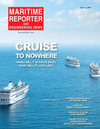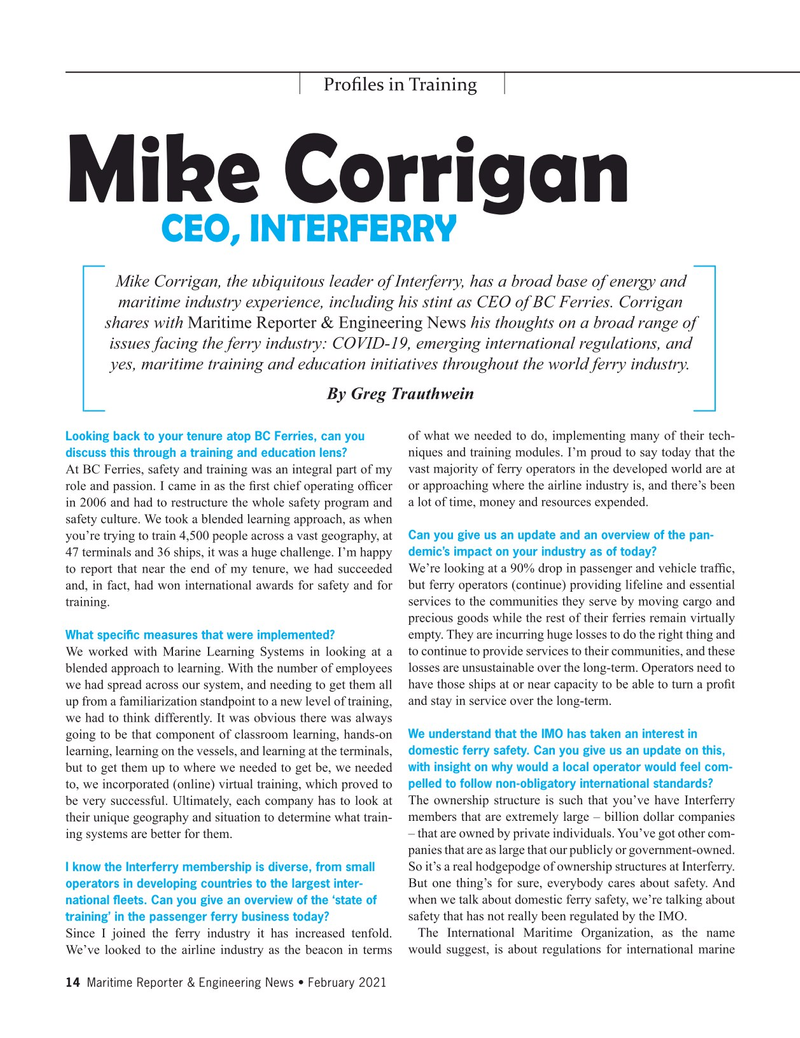
Page 14: of Maritime Reporter Magazine (February 2021)
Government Shipbuilding
Read this page in Pdf, Flash or Html5 edition of February 2021 Maritime Reporter Magazine
Pro? les in Training
Mike Corrigan
CEO, INTERFERRY
Mike Corrigan, the ubiquitous leader of Interferry, has a broad base of energy and maritime industry experience, including his stint as CEO of BC Ferries. Corrigan shares with Maritime Reporter & Engineering News his thoughts on a broad range of issues facing the ferry industry: COVID-19, emerging international regulations, and yes, maritime training and education initiatives throughout the world ferry industry.
By Greg Trauthwein of what we needed to do, implementing many of their tech-
Looking back to your tenure atop BC Ferries, can you niques and training modules. I’m proud to say today that the discuss this through a training and education lens?
At BC Ferries, safety and training was an integral part of my vast majority of ferry operators in the developed world are at role and passion. I came in as the ? rst chief operating of? cer or approaching where the airline industry is, and there’s been in 2006 and had to restructure the whole safety program and a lot of time, money and resources expended.
safety culture. We took a blended learning approach, as when
Can you give us an update and an overview of the pan- you’re trying to train 4,500 people across a vast geography, at demic’s impact on your industry as of today?
47 terminals and 36 ships, it was a huge challenge. I’m happy to report that near the end of my tenure, we had succeeded We’re looking at a 90% drop in passenger and vehicle traf? c, and, in fact, had won international awards for safety and for but ferry operators (continue) providing lifeline and essential training. services to the communities they serve by moving cargo and precious goods while the rest of their ferries remain virtually empty. They are incurring huge losses to do the right thing and
What speci? c measures that were implemented?
We worked with Marine Learning Systems in looking at a to continue to provide services to their communities, and these blended approach to learning. With the number of employees losses are unsustainable over the long-term. Operators need to we had spread across our system, and needing to get them all have those ships at or near capacity to be able to turn a pro? t up from a familiarization standpoint to a new level of training, and stay in service over the long-term.
we had to think differently. It was obvious there was always
We understand that the IMO has taken an interest in going to be that component of classroom learning, hands-on domestic ferry safety. Can you give us an update on this, learning, learning on the vessels, and learning at the terminals, with insight on why would a local operator would feel com- but to get them up to where we needed to get be, we needed pelled to follow non-obligatory international standards?
to, we incorporated (online) virtual training, which proved to be very successful. Ultimately, each company has to look at The ownership structure is such that you’ve have Interferry their unique geography and situation to determine what train- members that are extremely large – billion dollar companies ing systems are better for them. – that are owned by private individuals. You’ve got other com- panies that are as large that our publicly or government-owned.
So it’s a real hodgepodge of ownership structures at Interferry.
I know the Interferry membership is diverse, from small
But one thing’s for sure, everybody cares about safety. And operators in developing countries to the largest inter- when we talk about domestic ferry safety, we’re talking about national ? eets. Can you give an overview of the ‘state of safety that has not really been regulated by the IMO.
training’ in the passenger ferry business today?
Since I joined the ferry industry it has increased tenfold. The International Maritime Organization, as the name
We’ve looked to the airline industry as the beacon in terms would suggest, is about regulations for international marine 14 Maritime Reporter & Engineering News • February 2021
MR #2 (1-17).indd 14 2/4/2021 1:14:34 PM

 13
13

 15
15
